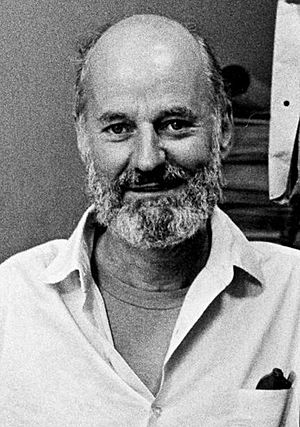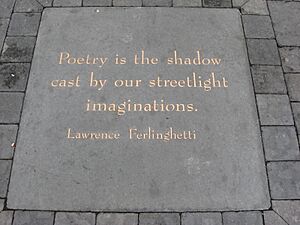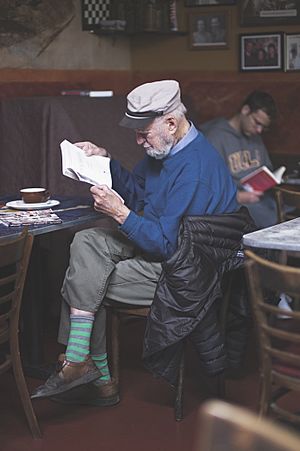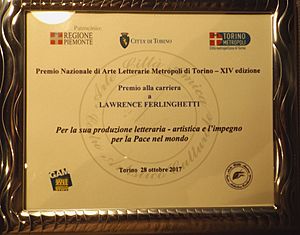Lawrence Ferlinghetti facts for kids
Quick facts for kids
Lawrence Ferlinghetti
|
|
|---|---|

Ferlinghetti in 1965
|
|
| Born | Lawrence Monsanto Ferlinghetti March 24, 1919 Yonkers, New York, U.S. |
| Died | February 22, 2021 (aged 101) San Francisco, California, U.S. |
| Occupation |
|
| Alma mater | |
| Literary movement | Beat poetry |
| Years active | 1953–2021 |
| Spouse |
Selden Kirby-Smith
(m. 1951–1976) |
| Children | 2 |
Lawrence Monsanto Ferlinghetti (born March 24, 1919 – died February 22, 2021) was an American poet, painter, and social activist. He also helped start City Lights Booksellers & Publishers. Ferlinghetti wrote many things, including poetry, stories, plays, and art reviews. He was most famous for his second poetry book, A Coney Island of the Mind (1958). This book was translated into nine languages and sold over a million copies! When he turned 100 in 2019, the city of San Francisco even named his birthday, March 24, "Lawrence Ferlinghetti Day."
Contents
Growing Up and Early Life
Lawrence Ferlinghetti was born in Yonkers, New York, on March 24, 1919. His father passed away before he was born. His mother had to go to a hospital shortly after. He was raised by an aunt and later by foster parents. He went to Mount Hermon School for Boys and then to the University of North Carolina at Chapel Hill. There, he earned a degree in journalism in 1941. He started his writing career by reporting on sports.
He served in the U.S. Navy during World War II. He was the captain of a submarine chaser during the Normandy invasion. After the war, in 1947, he earned a master's degree in English literature from Columbia University. He then went to the University of Paris and earned a Ph.D. in comparative literature.
In 1951, Ferlinghetti moved to San Francisco. In 1953, he opened City Lights Bookstore in North Beach with a partner, Peter D. Martin. They each put in $500. In 1955, Ferlinghetti bought out Martin's share and started a publishing company with the same name. He published a series called the Pocket Poets Series. He became famous for publishing Allen Ginsberg's poem Howl. He was arrested because some people thought the poem was inappropriate. This led to a big trial in 1957 about freedom of speech. Ferlinghetti was found not guilty, which was a big win for free expression.
His Poetry

Ferlinghetti published many poets from the Beat Generation. Some people even considered him a Beat poet. However, Ferlinghetti himself said he wasn't a Beat poet. He said in a 2013 film, "Don't call me a Beat. I never was a Beat poet."
Ferlinghetti believed that art should be for everyone, not just a few highly educated people. He wanted his poetry to be easy for all people to understand and enjoy. He often used everyday language in his poems.

Critics have noticed that Ferlinghetti's poems often create strong pictures in your mind, like a painting. This makes sense because he was also a painter! One critic said his poems "tell little stories, make 'pictures'." For example, in his poem "In Golden Gate Park that Day," he describes a man wearing "green suspenders" and his wife carrying "a bunch of grapes." His words paint a clear picture of everyday American life.
Ferlinghetti's poetry also often connected with other art forms, especially jazz music. He often read his poems with jazz music playing in the background. His free verse style of poetry tried to capture the spontaneous and creative feeling of jazz.
His Political Views
When Ferlinghetti moved to San Francisco in 1951, he met poet Kenneth Rexroth. Rexroth's ideas about philosophical anarchism influenced Ferlinghetti's political thinking. A philosophical anarchist believes in a society without a government, where people are free and cooperate. Ferlinghetti said he was "an anarchist at heart." However, he also thought that for pure anarchism to work, everyone would need to be like "saints." So, he supported ideas like democratic socialism, which is a system where the government helps provide services for everyone.
In 1967, he was a speaker at the "Human Be-In," a large gathering in San Francisco. This event helped start the city's "Summer of Love." In 1968, he signed a pledge to refuse to pay taxes to protest the Vietnam War.
In 1998, when he became San Francisco's Poet Laureate, Ferlinghetti encouraged people to vote. He wanted them to remove a damaged part of the Central Freeway and replace it with a tree-lined street. He argued that cars were destroying the "poetry of a city." He believed cities should be designed for people, not just cars.
His Painting
Besides writing and publishing, Ferlinghetti also painted for 60 years. His artwork was shown in many galleries and museums across the United States.
In 1996, he painted The beautiful Madonna of Sandusky Oh! hi! O! And friend. This painting was later damaged and covered up by a janitor. Ferlinghetti responded by painting a funny message on the parts that had been covered.
In 2010, a special show of his artwork, called 60 Years of Painting, was held in Rome and Reggio Calabria, Italy.
Jack Kerouac Alley
In 1987, Ferlinghetti helped transform Jack Kerouac Alley. This alley is located next to his City Lights Bookstore. He suggested to the city that the alley should be repaved and improved.
His Passing
Lawrence Ferlinghetti passed away on February 22, 2021, at his home in San Francisco. He was 101 years old.
Awards and Honors
Ferlinghetti received many awards during his life. These include the Los Angeles Times' Robert Kirsch Award and the ACLU Earl Warren Civil Liberties Award. He also won several awards in Italy, such as the Premio Taormina. In 2017, he received the Career Award in Turin, Italy.
In 1998, he was named San Francisco's Poet Laureate for two years. In 2003, he received the Frost Medal from the Poetry Society of America. He was also chosen to be a member of the American Academy of Arts and Letters. In 2005, the National Book Foundation gave him the first-ever Literarian Award for his great service to American literature. In 2007, France honored him with the title Commandeur, French Order of Arts and Letters. In 2012, he was offered the Janus Pannonius International Poetry Prize from Hungary. However, he chose not to accept it. He declined because he disagreed with the Hungarian government's actions, which he felt were limiting people's freedoms.
Images for kids
See also
 In Spanish: Lawrence Ferlinghetti para niños
In Spanish: Lawrence Ferlinghetti para niños






